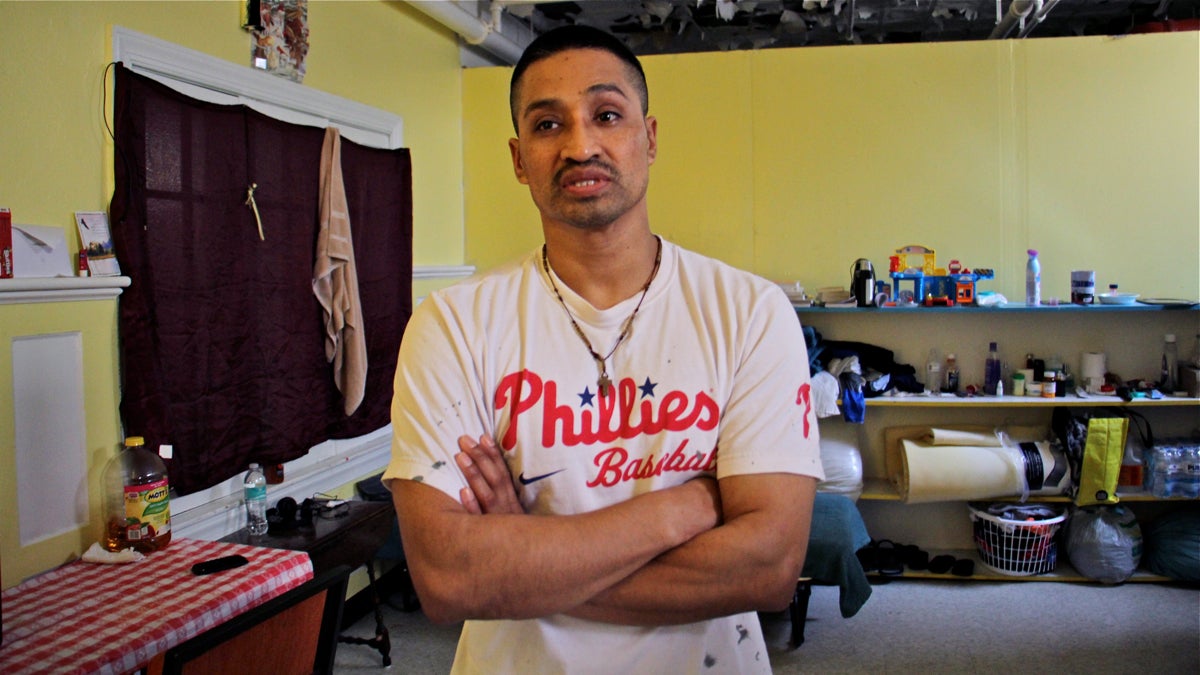Five months after finding sanctuary in Philly church, he’s still living in limbo
Listen
Javier Flores, facing deportation, sought sanctuary at the Arch Street Methodist Church. (Emma Lee/WHYY)
In some ways, Javier Flores’ living space looks more like a college dorm room than a church basement.
There’s a mini-fridge and a microwave, shelves full of cereal boxes and cans of tuna fish.
But then, you notice the narrow cot in the corner, the multicolored sippy cups and the stacks of children’s books, including a bilingual copy of “The Very Hungry Caterpillar.”
“It’s not right for a human being to be here, but I think it was the option we had … to be together with my family, with my sons,” Flores said through a translator. “The oldest one, 5 years old, is here with me all the time.”
Flores said the boy refuses to go to school where he was getting help for the trauma he experienced while his father was in an immigrant detention center in Pike County, Pennsylvania, for 16 months.
Flores is not authorized to be in the U.S. He has been deported to his native Mexico and returned to America three times. He claims a previous immigration attorney swindled him and gave him bad legal advice, which eventually landed him in the detention center.
Meanwhile, Flores said, his family struggled. His 13-year-old stepdaughter attempted suicide and the 5-year-old, Javier Junior, was diagnosed with post-traumatic stress disorder.
At the urging of his lawyer, immigration officials released Flores for 90 days to help the children’s mother with the three kids, who are U.S. citizens and live in Northeast Philadelphia.
On Nov. 13, the day he was slated to go back, he decided to do something immigrant advocates describe as the “last resort:” taking sanctuary at Arch Street United Methodist Church in Center City Philadelphia, a stone’s throw from City Hall. As a matter of policy, U.S. Immigration and Customs Enforcement or ICE rarely removes unauthorized people from what it calls “sensitive locations,” such as schools and churches.
Thursday will mark five months since Flores moved into the church.
According to the New Sanctuary Movement, an advocacy group, Flores is the only unauthorized immigrant in the region currently taking sanctuary. But assistant director Blancha Pacheco said the organization has gotten an influx of calls from congregations interested in offering sanctuary and in trainings to thwart ICE raids as the Trump administration has promised to crack down on unauthorized immigrants.
“When we had conversations with immigrant members about how they felt about taking sanctuary … [they said] unless it’s a last resource, we don’t want to take sanctuary,” said Pacheco. “It’s not an easy decision to make.”
While his move-in day garnered widespread media attention, Flores has kept to himself in the months since, except for visits from his family, his lawyer, immigrant advocates and this week, a film crew with the CBS News program “60 Minutes” who brought in Mayor Jim Kenney.
Helping out around the church
Flores said he knew living in the church would be better than detention, but staying in one place 24 hours a day, seven days a week, is mentally taxing.
“You have to psych yourself up for the situation because the more you see people walking outside, the sun, like you get more depressed,” he said. “So staying here, reading or watching TV calms me.”
Flores also spends time working around the church, painting or cleaning the bathrooms on Sundays after worship services. When Javier Junior is there, they play together, running around the large hall in the basement just outside the makeshift bedroom.
Meals come from his longtime partner, Alma Sanchez, or from the homeless feeding program run by the church.
Flores holds back tears when he speaks about seeing people walk outside the church’s large side door onto Broad Street.
“You’re like one step from being able to go out, but then there is still that fear of going out and that the immigration officers are right outside,” he said.
If he does go outside, the black monitor around his right ankle will alert federal immigration authorities.
Still, he believes there’s a chance he could go home to his family in Northeast Philadelphia.
Seeking special visa for victims of crime
Flores’ lawyer, Brennan Gian-Grasso, said he could qualify for a special “U visa” for crime victims who cooperate with law enforcement.
In 2004, two men stabbed Flores with box cutters. He helped Bensalem police find the perpetrators who eventually pleaded guilty to assault. The question is whether the U.S. Citizenship and Immigration Services will decide the attack — and the help he gave local police — outweigh the times he flouted U.S. immigration law.
Flores’ U visa application is still pending.
“We don’t know exactly when it will be decided,” Gian-Grasso said. “There’s no time frame for these things.”
So, Flores waits. Sometimes, he dreams about buying a house with his partner and going back to his old job trimming trees.
“I’m not doing well, but I have to keep fighting,” he said. “I have to keep moving forward.”
“Hope is the last thing to die,” he added.
WHYY is your source for fact-based, in-depth journalism and information. As a nonprofit organization, we rely on financial support from readers like you. Please give today.




